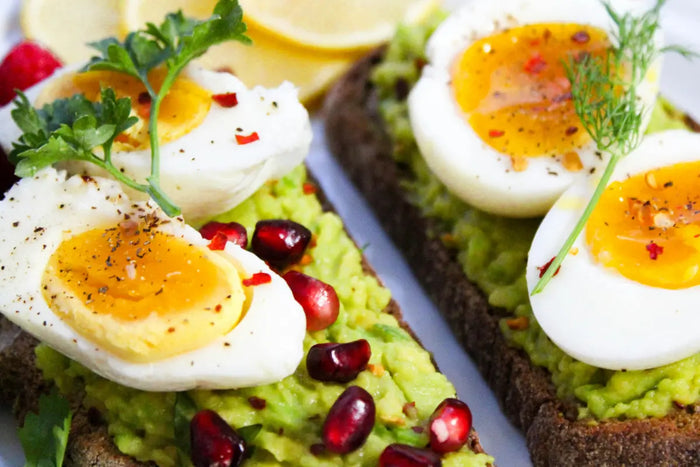There are a number of reasons why people integrate protein into their diets, including to assist in their weight loss efforts, to boost their metabolism, gain muscle and even help in injury recovery. With gyms and offices opening up, this means that our lives are slowly creeping back to the busy schedules we once knew. So, we need to start getting a bit more creative and come up with on-the-go ways to take protein...
How do I take protein?
If you’re an avid-protein user, you’re probably already consuming protein shakes (protein scoops and water) and maybe even baking them into healthy treats.
It’s undebatable – protein powders are an extremely high-quality source of protein that is really easily integrated. So, to make your life easier, we’ve hooked you up with some protein high recipes to guide you along the way – don’t say we don’t treat you.
So, here are our top five favourite strategies to implement protein powder recipes in your life...
1. Protein Smoothies
Smoothies are a really popular way to integrate protein into your diet due to their versatility. The smoothie combinations are endless. Easy and quick to make and great to pack for your morning commute, smoothies are a great breakfast replacement due to their filling nature.
You can include:
FruitsSome of our favourites to chuck into smoothies include bananas, strawberries, blueberries and apples.
VegetablesWe recommend using spinach, kale and beetroots. All of these will add a great colour to your drink and a healthy amount of iron.
YoghurtAny yoghurt will work for these – but we love Greek or Natural. Adding yoghurt to your smoothie adds a great amount of protein – 24 grams per cup, to be precise!
Flax and Chia SeedsFlax and chia seeds are great to add into smoothies to thicken up the consistency and gain some extra nutrients. These are great as they don’t bring any new flavours, but just add lots of good elements to your drink.
HoneyA great natural sweetener, honey not only improves the taste of smoothies, but adds a bunch of essential nutrients to your smoothie, including calcium and magnesium.
MilkWhatever your milk of choice: dairy, almond, oat or other, milk or another liquid like fruit juice or water is an important part of a smoothie to ensure a smooth blend.
Any other tips?
We recommend 1-2 scoops per smoothie, or around 15g-30g of protein, however you prefer to measure.
We love mixing 250ml of your chosen milk, 100ml of brewed coffee, 1 scoop of protein powder and 1 banana for the ultimate wake-me-up breakfast smoothie. If fruity protein high recipes are your thing – why not try 200ml of milk, 1 scoop of protein, one whole banana and a handful or two of mixed berries. Top it off with some chia seeds… perfection.
2. Protein Bars
Protein bars are another popular way to integrate protein into your diet on-the-go. These are a great lunch-time addition or perfect for giving you a pre-workout energy boost!
Benefits of Protein Bars
- Quick and Convenient
- On-The-Move
- Perfect Pre or Post Workout
- Curbs Your Appetite
Make Your Own
If you want to avoid store-bought protein bars, making your own is a great alternative. Homemade protein bars allow you to save money and give you the added benefit of putting you in control – you can add whatever you want.
3. Protein Pancakes
Protein pancakes are a really delicious way to add protein into your diet and are a great way to curb your sweet tooth if you’re trying to stay on-plan.
Top tip: add honey, fruit or yoghurt on the top to tackle your 5-a-day, too!
4. Baking With Protein
Baking with protein is probably our favourite alternative method, because using protein powders as a white flour alternative allow you to alter some of your favourite recipes. Whether that be cookies, cakes or muffins – substitute one third of your flour for one third of a protein powder or flavour of your choice and integrate your protein ingestion into your sweet treats.
If you need a bit of inspiration, we particularly love these Chocolate Fudge Brownies…
5. Protein Cereal
Don’t worry, we aren’t suggesting you start making your own cereal. That would be pretty time consuming. If you’re not so into breakfast smoothies and want to mix up your breakfast, you can actually add your protein powder to your cereal through the milk topping.
Dissolve one cup of protein powder into your milk before pouring over your cereal, and hey-presto, you’ve got protein cereal. If that’s not your scene, though, some branded cereals are pretty high in protein, too.
Summary
Whatever your need for implementing protein into your diet – we love any way that we can make this as delicious as possible. If you’re unsure where to start, check out our guide and discover the right protein for you.
Our proteins are packed with active ingredients to help you maximise your potential and nail your workouts, each of our proteins; whether that be the The Strong Protein; The Lean Protein; The Health Protein or The Fit Protein can be added into your meals and shakes to create exciting, protein high recipes that are great for at home or on the go.


















